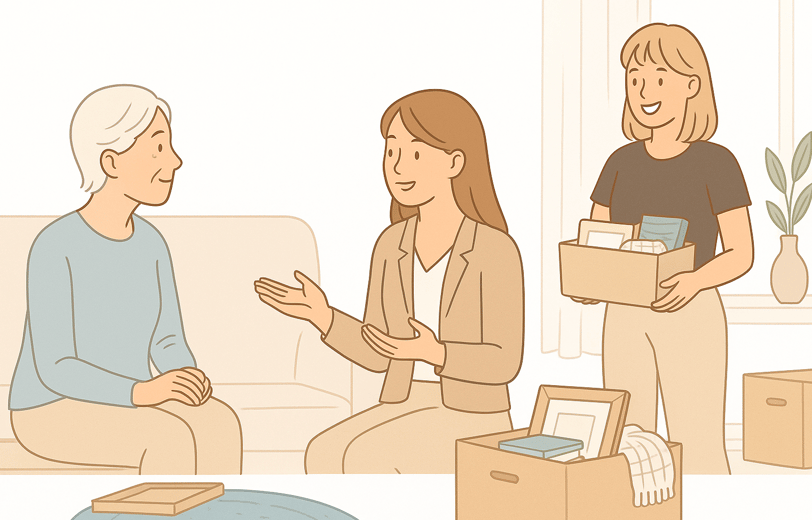How to Talk to Aging Parents About Decluttering With Respect
Learn how to navigate decluttering conversations with aging parents. A compassionate, research-informed guide for families preparing for transitions and downsizing.Blog post description.
Magic Storage Touch | Gabrielle
5/9/20253 min read
🧠 How to Talk to Aging Parents About Decluttering (Without Causing Conflict)
For many adult children, helping aging parents declutter or downsize is one of the most emotionally charged challenges they face. What may seem like “just stuff” to one generation can hold decades of identity, comfort, and memory for another.
It’s natural to want to ease your parents’ living situation — to help them stay safe, simplify their home, or prepare for a transition. But the conversation often brings up fear, resistance, or even tension between family members.
This guide offers a compassionate, research-informed approach to initiating and navigating these conversations — with empathy, clarity, and dignity at the center.
1. Understand What Decluttering Means Emotionally
To older adults, belongings often serve as anchors to memory and meaning. A kitchen tool isn’t just a utensil — it’s a link to holiday meals. A drawer of papers may feel like the only remaining evidence of their life’s work.
Research from the Journal of Aging Studies shows that seniors experience strong emotional attachment to possessions, particularly when those items symbolize control, independence, or legacy.
Before you begin any conversation, approach the topic with emotional awareness. This isn’t about getting rid of junk — it’s about navigating loss, identity, and change.
2. Choose the Right Moment and Language
Timing and tone are everything. Avoid starting the conversation during a moment of stress, or when you're in "project mode." Instead:
Find a quiet, non-rushed time
Start with curiosity, not urgency
Use inclusive language: “Would it feel helpful if we looked at this together?” vs. “You need to get rid of that.”
Keep the tone light, open, and non-judgmental. You're not there to fix them — you're there to support them.
3. Focus on Their Goals, Not Yours
Instead of making it about your preferences (or your fear of having to sort it all later), shift the lens:
“What would make your daily routines feel easier?”
“Are there areas of the home that feel hard to keep up with lately?”
“What would help you feel more relaxed at home?”
This approach invites them to be the decision-maker, reframing decluttering as a gift of comfort and control, not loss.
4. Start Small and Build Trust
Don’t begin with the attic full of keepsakes. Start with low-emotion zones:
Expired food in the pantry
Bathroom products
Old paperwork that’s no longer needed
Success in these smaller categories builds momentum — and trust — for deeper areas later on.
Pro Tip: Offer to help, but let them lead. Feeling in control is critical to cooperation.
5. Acknowledge Resistance with Respect
It’s normal for aging parents to resist. Instead of pushing, validate their concerns:
“I can see this is hard to think about — that makes complete sense.”
“You’ve had this for a long time. What’s the story behind it?”
“It’s okay to take our time.”
When people feel heard, they’re more open to change.
6. Talk About Safety and Peace — Not Just Space
Many older adults worry about falling, navigating clutter, or being overwhelmed — but they may not connect those issues to organization.
Rather than emphasizing aesthetics or tidiness, reframe decluttering as a way to protect independence:
Clear walkways = fewer falls
Labeled drawers = less confusion
Simplified spaces = easier rest
It’s not about having a “minimalist” home. It’s about feeling confident, safe, and calm every day.
7. Consider Bringing in a Neutral Third Party
Sometimes, adult children and aging parents carry old dynamics that make collaboration difficult. In those cases, working with a professional organizer trained in senior transitions can make all the difference.
Organizers bring:
Neutral, non-family support
Step-by-step plans that reduce overwhelm
Emotional sensitivity and experience with life transitions
This keeps the process calm, forward-focused, and relational, not reactive.
✨A Conversation Rooted in Respect
Helping aging parents declutter is rarely just about stuff — it’s about how we face change, aging, and legacy together.
By approaching these conversations with patience, empathy, and a long-term view, you create an opportunity to practically support your loved ones and deepen your relationship in a meaningful way.
If your family is preparing for a transition or needs support with senior downsizing, our organizing services offer calm, respectful guidance grounded in experience and care.
At Magic Storage Touch, we bring more than just hands — we bring heart.
_Gabrielle 💛


Presence in
Miami-Dade
Florida, United States
Contacts
786 514 8609
magicstoragetouch@gmail.com
